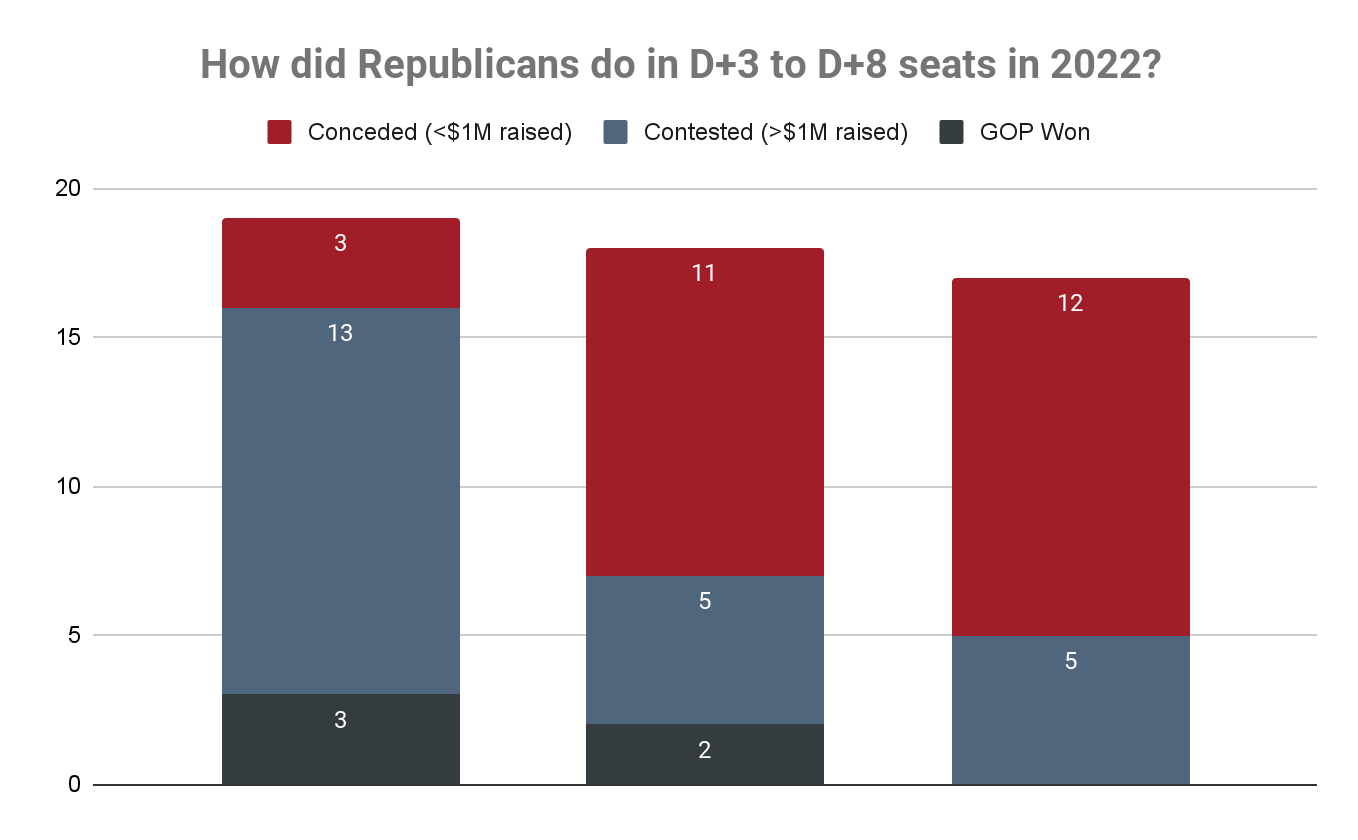Two years ago, we published the findings from our first quarterly “Conceding Democracy” analysis in NBC News. As we wrote at the time:
If Democrats want to retain the House, our best shot for doing so is racking up wins in districts that went for President Donald Trump in 2020. The candidates who will be competitive in those districts are on the right flank of the party, and it’s time for all Democrats to help them.
What followed was a series of reports that analyzed quarterly campaign finance reports to figure out which potentially competitive GOP-held seats Democrats were at risk of conceding in 2022.
With each passing quarter, we continued to raise the alarm about the more than a dozen seats where Democrats were neglecting to finance credible challenges to democracy-undermining Republican incumbents.
When the dust settled on the midterms, we took a look at all the seats with a Cook Partisan Voting Index (PVI) ranging from R+3 to R+8 — a segment of districts that broke for Trump in 2020 but where he didn’t receive much more than 50% of the vote share.
In those districts, we found too many “Democracy Deserts”: battlegrounds where Democrats should be competitive if they invest enough money in the right challenger, but where no such investments were made.

Similarly, here’s how Republicans did in the crop of symmetrical seats on the other side of the aisle:
Online and on the airwaves, we’re inundated with polarization porn which suggests that electoral calcification and partisan gerrymandering have made competition virtually impossible in today’s political landscape.
But a quick look under the hood paints a dramatically different picture: far from competition being impossible, the parties aren’t even bothering to try to compete in what should be some of the most competitive districts in the country. We are conceding without even showing up to play.
As we said of 2022, a year where Democrats lost the House by a razor-thin five-vote margin: it didn’t have to be this way. If Democrats had fielded credible challenges in just a dozen or so more potentially winnable seats, Kevin McCarthy could still be Minority Leader.
We can’t afford to make the same mistake in 2024.
Democrats Are Doing It Again
With fundraising having now kicked off for 2024 and end-of-Q2 campaign finance reports filed, we returned to FEC.gov to see how things are shaping up for next cycle.
Are Democrats responding to the stakes of this next election by funding strong challengers in winnable GOP-held seats, or are they allowing for more democracy deserts?
Here’s how they were doing in the 45 GOP-held seats with a PVI between R+3 and R+8 by the end of Q2 2023:
There was no Democratic challenger filed to run in 19 of these 45 seats. Notably, this includes 5 districts where Trump secured less than 52% of the vote in 2020.
Democratic challengers had reported raising any funds at all in just 14 of these seats.
Democratic challengers had $200,000+ in cash on hand in only 7 of these seats
Republicans Are Doing It Too
Republicans win more Biden seats than Democrats do Trump seats, but it’s important to point out that the challenge of addressing democracy deserts is a bipartisan one.
In the 48 Democratic-held seats with a PVI between D+3 and D+8, here’s how Republicans were doing at the end of Q2:
There was no Republican filed to run in 23 of these 48 seats.
Republicans only reported raising anything at all in 20 of these seats.
Republican challengers had $200K+ in cash on hand in just 4 of these seats.
Compete Everywhere to Save Our Democracy
There are democracy deserts in some of the most flippable seats on both the right and the left.
It’s hard to take polarization porn very seriously when the parties are neglecting to compete in some of what should be the most competitive seats in the country. And while it’s early on in the 2024 cycle, we’re already seeing worrying signs that voters will again be denied genuine choices at the ballot box next November.
From democracy reform groups like Fix Our House to political rating agencies like Cook Political Report, there are lots of loud voices pushing a polarization narrative that says competition is impossible and the only way to save our democracy is by changing the rules of the game:
These polarization hawks aren’t wrong to point out that the rules aren’t fair, but they are wrong to suggest competition is futile. Not only are such rule changes often predicated on winning majorities, but we aren’t even competing in some of the most competitive seats in the country!
The formula remains as simple as it’s ever been: win the middle, save democracy.









The naysayer organizations are noted in the post eg Fix Our House. It is crucial to identify WHO/which group is spearheading efforts to run in as many of these democracy desert seats as possible. We know it is NOT DCCC. They don’t even assist campaigns until a critical dollar threshold is passed.